'You have 10 minutes to get out of your house!’
DUBAI, April 8, 2015 – Months of bloody combat in one of the world’s poorest countries. A web of warring factions pitting Iran-backed Shiite rebels against militias loyal to a fugitive president, both Al-Qaeda and Islamic State jihadists, and a Sunni coalition led by Saudi Arabia. There you have the ingredients of the escalating conflict in Yemen, as difficult for an outsider to grasp as it is perilous for journalists to cover on the ground.
In the evening of March 31, our correspondent in the southern city of Aden, Fawaz al-Haidari, received a tip-off from a leader of the "popular committees" militias loyal to President Abedrabbo Mansour Hadi: “You have 10 minutes to get out of your house. It’s about to be bombed!”
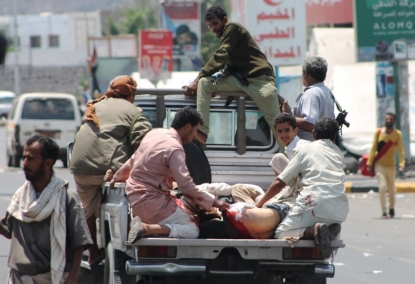 Injured people are evacuated on the back of a vehicle in the Yemeni city of Aden on March 26, 2015 (AFP Photo / Saleh al-Obeidi)
Injured people are evacuated on the back of a vehicle in the Yemeni city of Aden on March 26, 2015 (AFP Photo / Saleh al-Obeidi)The tip turned out to be accurate. The Dar Saad neighbourhood, the northern entrance to Aden where the Huthi Shiite rebels had just deployed, came under aerial attack by Saudi warplanes as our 29-year-old reporter fled with his wife and father to the home of a friend, in Basateen on the town outskirts.
They were not safe there, either. All night long fighters traded gunfire, many of them high from chewing on the narcotic herb khat. In the morning, Fawaz picked up a few belongings from his home, and left Aden with his relatives for the town of Taez, to the north.
In chaos, Al-Qaeda frees 300 prison inmates
Throughout all this upheaval, our correspondent in southern Yemen continued to provide us with reliable information, 24 hours a day, gathered from his regular sources: top army brass, senior officials, doctors and activists from the port city of Aden, which has paid a heavy price in civilian lives since the outbreak of fighting.
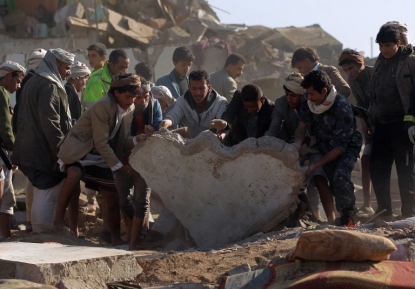
Searching for survivors in the rubble of buildings destroyed in Saudi air strikes against Huthi rebels, near Sanaa Airport,
on March 26, 2015 (AFP Photo / Mohammed Huwais)
Thanks to his sources in other provinces, Fawaz was also first to announce that hundreds of Al-Qaeda fighters had stormed the coastal city of Mukalla on April 2, taking advantage of the chaos to free more than 300 prison inmates including one of their leaders. Fawaz is familiar with Al-Qaeda in the Arabian Peninsula. He began working for AFP in 2010, reporting on a string of spectacular attacks staged by the extremists in southern Yemen.
Reporting on Aden's plight
Two of his colleagues, video reporter Nabil Hassan and photographer Saleh Al-Obeidi, are still on the ground in Aden, reporting day after day on the plight of Yemen’s second city, despite a very real risk to their lives. Their images are being used around the world.
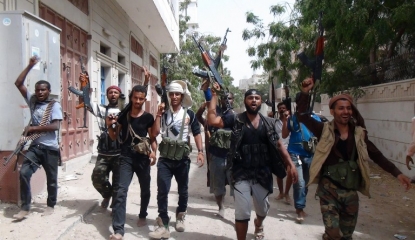
Yemeni fighters opposing the Huthi rebels shout slogans in the southern Yemeni city of Aden
on April 8, 2015 (AFP Photo / Saleh al-Obeidi)
Further north in Sanaa, our correspondent Jamal Al-Jabiri reported with relief, on the morning of April 6, that the night had been the quietest since the launch 10 days earlier of Saudi-led air strikes targeting the Huthi rebellion that has seized swathes of the country including the capital.
The Sanaa region has been cowering under a punishing air war that has targeted rebel bases and installations, and terrorized the local population. Yet Jamal has been out, every day, gathering poignant stories that add crucial human perspective to our coverage.
The 35-year-old reporter, who has worked for AFP since 2009, was on the ground on March 20 when suicide bombers attacked two mosques in the capital, killing 142 people and injuring 351. The Islamic State claimed responsibility for the twin attacks, as well as another in the Huthi's northern stronghold of Saada.
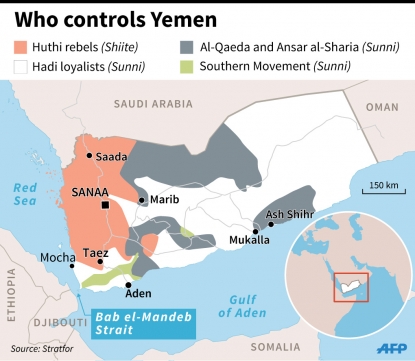
From the AFP bureau in Dubai, our headquarters for the Arabian Peninsula, it seems as if our Sanaa correspondent never sleeps. He files late into the night, and by the time we arrive early the next morning there is already a string of emails waiting for us, completing the overnight picture for the whole north of Yemen.
Mildly envious of Fawaz’s exclusive on the Al-Qaeda storming of Mukalla, Jamal insisted we slip a crunchy detail of his into our story: the jihadists entered the central bank buildings, and sacked the place, but they failed to break into the bank safes after searching high and low for the codes.
'On the head of snakes'
It’s the job of the Dubai bureau to explain this remarkably complex conflict to the world. That is no easy task in a country where tribal, regional and religious loyalties are intertwined and allegiances can shift from one day to the next. The former president Ali Abdallah Saleh, who is now allied with the Huthis, once likened governing Yemen to “dancing on the head of snakes”.
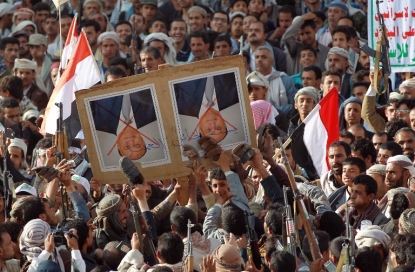 Tribal gunmen loyal to the Huthi movement deface a portrait of Yemeni President Abedrabbo Mansour Hadi with shoes in the capital Sanaa on April 1, 2015 (AFP Photo / Mohammed Huwais)
Tribal gunmen loyal to the Huthi movement deface a portrait of Yemeni President Abedrabbo Mansour Hadi with shoes in the capital Sanaa on April 1, 2015 (AFP Photo / Mohammed Huwais)The country of 24 million inhabitants has been sliding steadily towards chaos ever since 2011 when Saleh was ousted in a popular uprising, staged in the wake of the Arab Spring movements. Led by President Abd Rabbo Mansour Hadi, an apparatchik of the former communist state of south Yemen, the country’s new rulers were gradually undermined by the Huthis and by Al-Qaeda, often allied with local Sunni tribes. Both Huthis and jihadists built up influence, fighting each other all the while.
Decisive Storm: to counter the Huthis, and Iran
The Huthi rebellion seized the presidential palace in late January, having overrun huge swathes of north and central Yemen. President Hadi spent more than a month sheltering in Aden, before finally fleeing to Saudi Arabia on March 25. The next day, a nine-country coalition led by Riyadh launched Operation Decisive Storm, an air war aimed at halting the Huthi offensive - and in the process preventing Iran from extending its influence in the Arabian Peninsula.
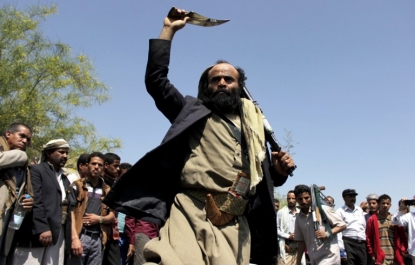 Supporters of the Shiite Huthi militia demonstrate in Taiz on April 1, 2015 against the Saudi-led Operation Decisive Storm in Yemen (AFP Photo / Abdel Rahman Abdallah)
Supporters of the Shiite Huthi militia demonstrate in Taiz on April 1, 2015 against the Saudi-led Operation Decisive Storm in Yemen (AFP Photo / Abdel Rahman Abdallah)Travelling to Yemen was already considered highly dangerous, in part because of the risk of kidnapping. The collapse of the state and the outbreak of hostilities make it simply impossible to go there: airports and ports are shut and no visas are being issued.
Since our longtime correspondent in Yemen Hammoud Mounassar was forced to leave the country on March 24, AFP’s entire coverage has relied on a network of stringers, doing an extraordinary job despite constant danger.
Huthis turned hostile to media
Our photo freelancer in Sanaa, Mohammed Huwais, 39, made the front page of Time Magazine, rewarding his work carried out in terribly tough conditions. For reasons not entirely clear, the Huthi rebels who have held the capital since September 2014 have recently turned far more hostile towards the media, after months of letting journalists do their job relatively unhindered. In recent months reporters have faced threats from the Shiite militias, and were unable to approach the presidential palace when it was taken by the rebellion.
Since the outbreak of war Mohammed, who has worked with AFP since 2010, has been drawing on a network of fellow freelancers elsewhere in the country. On the video side, Cairo-based Sami Al-Ansi has also been commissioning work from a Yemeni stringer, Hani Ali.
Aid groups have been warning in recent days of an impending humanitarian disaster in Yemen, most critically in Aden where the 800,000 residents are facing a twin onslaught from rebels looking to seize the city, and coalition bombs.
For journalists the war in Yemen in many ways recalls the situation in Syria: an increasingly violent and complex conflict, into which no foreign reporter can venture without risking being kidnapped or killed, and whose day-to-day coverage rests exclusively on the courage and talent of local professionals.
Rene Slama is the head of AFP's Dubai bureau, in charge of covering seven countries in the Arabian Peninsula, among them Yemen.
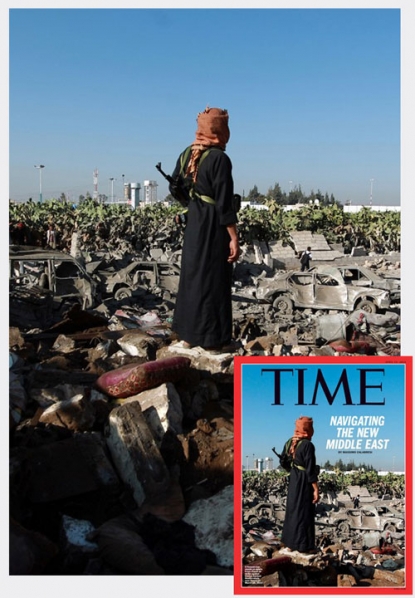 A Yemeni man examines damage done by a Saudi air raid against Huthi positions near Sanaa airport on March 26, 2015. The picture was used on the front page of Time magazine (AFP Photo / Mohammed Huwais)
A Yemeni man examines damage done by a Saudi air raid against Huthi positions near Sanaa airport on March 26, 2015. The picture was used on the front page of Time magazine (AFP Photo / Mohammed Huwais)

